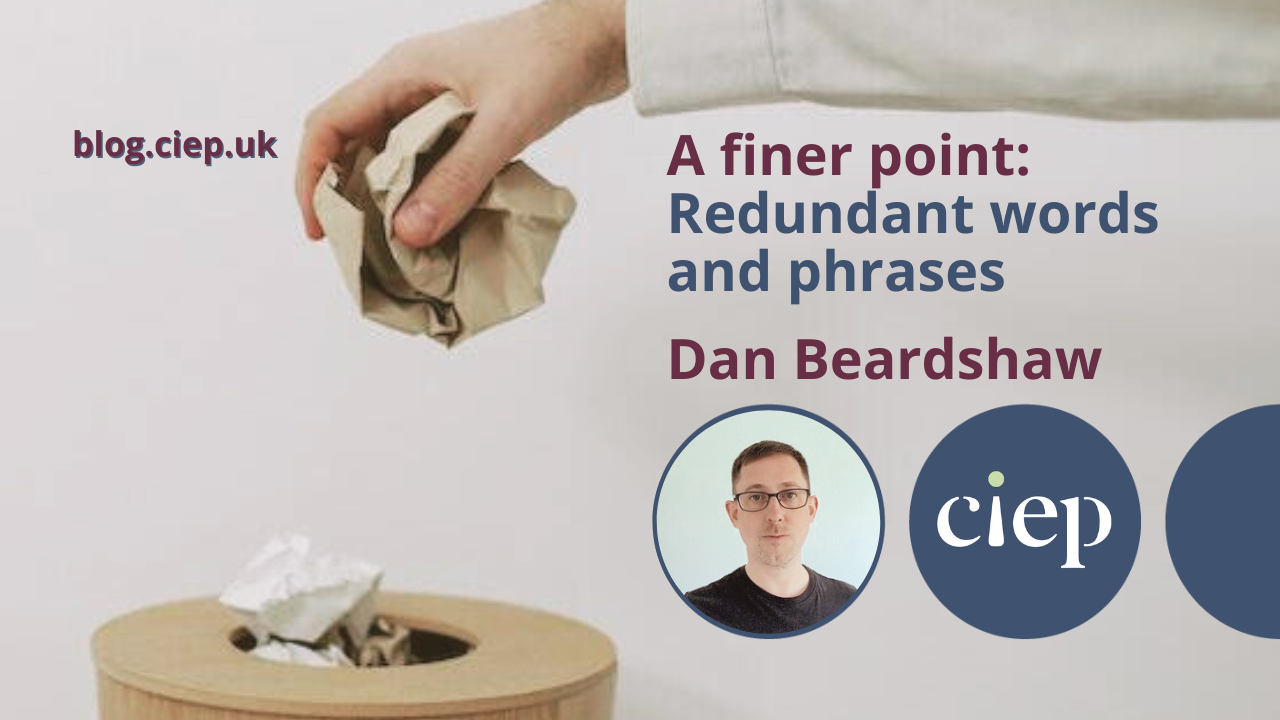For August’s A finer point, Dan Beardshaw takes a closer look at redundancy in writing and how we can improve concision by dealing with superfluous wordage.
‘Redundancy’ in writing refers to using more words than necessary or repeating a meaning across multiple words. Spotting and removing redundancies is a regular editorial task that aims to improve concision. Concise writing is both easier to read and stylistically appealing, and a message can have more impact without the distraction of reading unnecessary words. In this post I will highlight some common redundancies and ways to fix them, as well as cases for recasting or leaving them.
In order to
The phrase in order to can often be replaced with to.
Copyeditors remove redundancies in order to make text more concise.
The longer version is commonly used and may be considered more formal, but using to instead doesn’t imply informality when used in a formal context, and there’s no clear distinction in meaning between the two forms. The to that in order to can substitute will always be part of a verb in the ‘infinitive of purpose’ form. This use of to means ‘for the purpose of’ just as in order to does.
How in order to is used can affect any decision to change it. For example, fronted to-infinitive clauses are correct but less common, and may read more naturally with in order to.
To make text more concise, copyeditors remove redundancies.
In order to make text more concise, copyeditors remove redundancies.
In the event that
The same sense can be expressed here by the simple conjunction if.
In the event that If the train is cancelled, a replacement bus will be provided.
This phrase may, like in order to, be considered more formal. But if isn’t necessarily informal here either. Some might consider the longer form more polite – in the above example, it could imply a sense that everything possible will be done to avoid the inconvenient outcome. But if a message of that kind is essential, it may be better recast and expressed directly instead of expecting readers to infer it from a wordy form of if.
Due to the fact that
Similar to the previous entry, due to the fact that inflates a conjunction – in this case because.
Redundancies are removed due to the fact that because they make the reader work harder.
Considering the frequency of a word like because, word count could grow considerably over the course of a manuscript with habitual use of the wordier version. And again, there isn’t a clear case for the simple conjunction being less formal.
While we’re on the subject of this redundancy niche, it’s worth mentioning another commonly inflated conjunction: despite the fact that can be replaced with although, as can its six-worded synonym in spite of the fact that.
The reason why
At first glance, this might appear to be an obvious redundancy, and why can usually be cut.
The collapse of the economy was the reason why they lost the election.
But the case for treating it as a redundancy is less clear. In a related post, Patricia T O’Conner and Stewart Kellerman argue that the why in this phrase is a conjunction comparable to for which:
In this expression, “why” is a conjunction and means “for which” or “on account of which,” according to Merriam-Webster’s Collegiate Dictionary (11th ed.).
The noun “reason” in this usage means “cause” or “the thing that makes some fact intelligible,” Merriam-Webster’s says.
“Reason” in this sense, according to the Oxford English Dictionary, is commonly used with “why,” “that,” “for,” or an infinitive. So all of these uses are correct:
(1) “The reason we left early …”
(2) “The reason why we left early …”
(3) “The reason that we left early …”
(4) “Our reason for leaving early …”
(5) “The reason to leave early …”
The authors’ case illustrates how this potential redundancy differs in form to most others – the ‘extra’ word why here adds an optional part of speech that isn’t strictly tautological and wouldn’t be considered extraneous in equivalent cases, such as that in option 3. The post also notes the longevity of the usage, dating back as far as 1484.
Free gift
Gifts are always free, so the free in free gift is clearly redundant. This is a common category of redundancy in which a word or phrase directly duplicates the meaning of another. This kind of tautology might be considered a more precise definition of redundancy.
Brief summary
Following the flawed logic of free gift, the adjective brief repeats a meaning already contained in the noun it describes. The same could be said of brief moment.
Personal opinion
The redundancy here is that the sense of ‘personal’ is already implied by the pronoun that opinion will usually be joined to when referring to an individual. My/Your/Her/His/Their opinion all tell us who the opinion belongs to, so personal adds nothing to the meaning. Distinction from shared opinions isn’t necessary, either, as that would be similarly indicated by, for example, the board’s opinion or simply consensus. A related redundancy here is consensus of opinion – of opinion can be discarded.
Absolutely essential
In this case, an adverb duplicates the meaning of the adjective it describes. An author may have intended to add emphasis, but essential is already an emphatic adjective with an unmodifiable meaning – absolutely essential makes no more sense than slightly essential.
In conclusion
Redundancies are commonplace across most genres of writing. Removing redundancies can enhance the style, clarity and readability of a text. But it’s worth determining any specific reason the author may have for using one and, if there is a good reason, considering the options of either recasting to avoid the unnecessary words or leaving as is.
Resources
https://www.grammarphobia.com/blog/2012/09/reason-why.html
https://www.thoughtco.com/common-redundancies-in-english-1692776
Butterfield, J (ed.) (2015). Fowler’s Dictionary of Modern English Usage. Oxford: Oxford University Press, 693.
About Dan Beardshaw
Dan Beardshaw is a development editor, copyeditor and proofreader, specialising in ELT and education publishing. He is an Advanced Professional Member of the CIEP.
 About the CIEP
About the CIEP
The Chartered Institute of Editing and Proofreading (CIEP) is a non-profit body promoting excellence in English language editing. We set and demonstrate editorial standards, and we are a community, training hub and support network for editorial professionals – the people who work to make text accurate, clear and fit for purpose.
Find out more about:
Photo credits: rubbish bin by Cup of Couple; gift by Kim Stiver, both on Pexels.
Posted by Sue McLoughlin, blog assistant.
The views expressed here do not necessarily reflect those of the CIEP.




A nice summary, Dan. But I’d quibble with ‘in order to’. Yes, it’s usually a phrase with redundancy. But in some contexts it makes sense to include ‘in order’ so that the reason for an action can be emphasised, eg the writer reread the article carefully in order to avoid overlooking a mistake.
When editing, I often query rather than delete ‘in order’ to ensure that I’m not misunderstanding the writer’s intended meaning.
One I’d add to your list is ‘brand new’. If something’s new, why brand it as such?
So many nods in agreement!